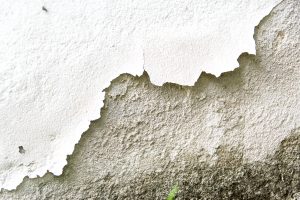
Many homes have concrete flooring, either in a basement, a garage, or if the house was built on a slab, throughout the entire home. If you are considering installing a floor over a concrete slab or surface, one of the most important things to do before you begin your installation is to test the concrete surface for the presence of any moisture.
Over eighty percent of all floor installation failures result from moisture problems. If moisture goes undetected at the time of a floor installation many future problems may arise. If a floor is installed on a moist or moldy concrete surface, over time various moisture-related problems including bubbling, buckling and peeling may occur. These problems are often costly to address.
According to HomeGuides.com, “Concrete slabs are naturally breathing elements of a home, readily taking in moisture and air, expanding and contracting and shifting with nature. While slabs are often left as-is, they can be covered with a variety of materials, such as tile, carpet and hardwood flooring. However, before you can install certain materials over the top of a concrete floor you must check to see if there is an excess amount of moisture present.“
A quality floor installation can only be successful if the surface area is completely dry and free of moisture. It is very important to have the concrete area tested for moisture before installing a floor.
The best way to determine if there is moisture present within a concrete surface is to have the area professionally tested. Advanced Moisture Testing can perform a complete moisture testing evaluation of any concrete surfaces in a residential home or a large commercial facility. They can perform comprehensive moisture tests including:
Calcium Chloride Test
A calcium chloride test is used to determine the rate of moisture emitted from a concrete slab. It can help to determine the acceptability and condition of the floor covering.
Core Testing
Core testing consists of drilling a portion of the concrete slab out and sending it to a lab for testing. The results help determine if certain contaminants are present in the slab, which would affect the installation of the floor covering.
F710 pH Test
This test can help to determine the alkalinity or acidity of the concrete slab. It is intended for the installation of resilient flooring.
Hood Test
A hood test determines the relative humidity above the surface of a concrete slab.
F2170 Concrete In-Situ RH
This test can determine the relative humidity in a concrete slab. If excessive moisture permeates from the slab after an installation, a floor covering system can fail.

If you have a concrete surface in your home or place of business, be sure to have the area professionally tested for moisture before installing any type of floor. If you are planning on installing a floor over a concrete surface, contact the experts at Advanced Moisture Testing before you begin, to perform any necessary moisture testing services. This will ensure a successful floor installation and eliminate any future flooring problems. Call for a consultation today at 631-567-9269 or 631-567-9314.
